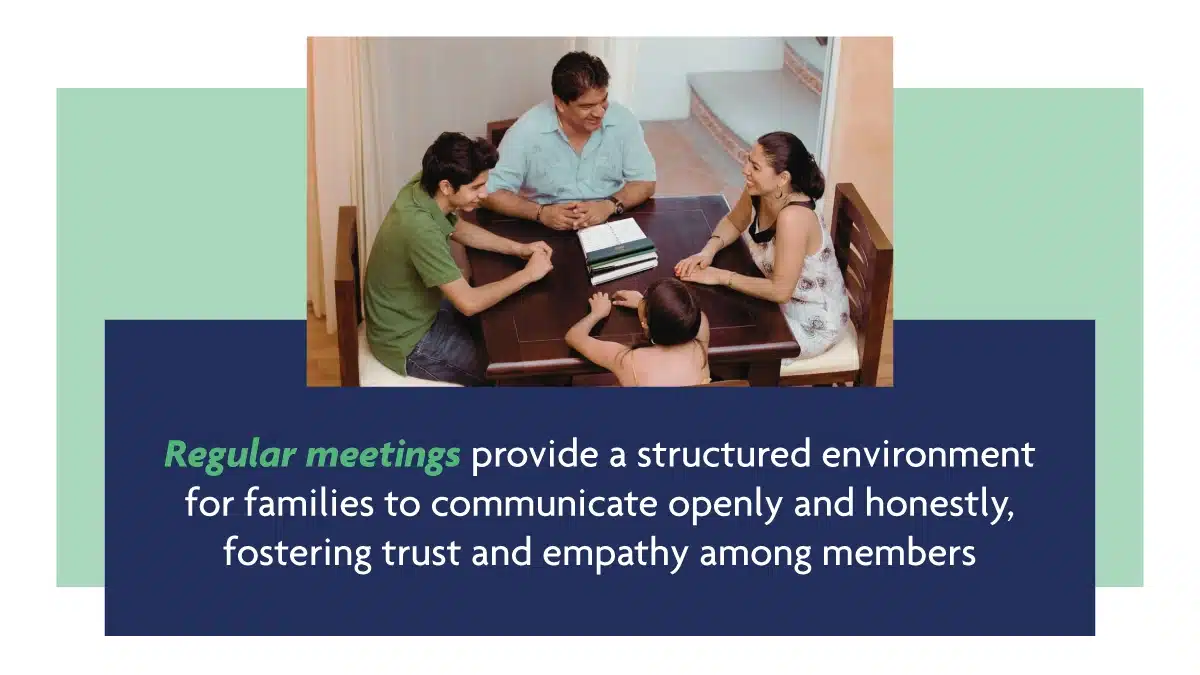The struggles faced by families of teens struggling with drug addiction are often profound, navigating a maze of emotions, uncertainties, and shattered expectations. Amidst this challenging situation, finding support becomes crucial for healing and resilience.
Meetings tailored for family members of people with an addiction play a pivotal role in offering solace and guidance. Read on to delve into the significance of these gatherings, exploring the diverse formats they take and what participants can anticipate from their invaluable engagement.
Key Takeaways
The struggles of families of a person with addiction are often silent battles fought with hope and the relentless pursuit of healing. Here is what you need to know:
- Meetings for family members of people with an addiction provide a sanctuary of empathy, where shared stories brighten paths of healing.
- The diverse array of support meetings offers a lifeline for families, imparting strategies for navigating the addiction journey.
- These meetings offer a reserve where individuals can find understanding, support, and guidance.
Our specialized teen treatment center is here to help teens and their families overcome the effects of addiction. Call us at (845) 479-6888 for more details.
Impact Of Drug Addiction On Families
Drug addiction can have a profound effect on families, especially when a teen is involved. Firstly, it can strain relationships within the family unit, leading to conflicts and misunderstandings. Parents may feel helpless and overwhelmed, not knowing how to support their struggling teen. Additionally, the emotional toll on family members can be immense as they witness their loved one battle with addiction.
In addition, drug abuse can disrupt entire family dynamics and routines. Parents may constantly worry about their teen’s safety and well-being, leading to disrupted sleep patterns and heightened stress levels. Siblings may feel neglected by the attention given to the addicted teen. Furthermore, financial strain is often a consequence of addiction, as families may find themselves spending significant amounts of money on treatment programs and recovery efforts.
Lastly, the stigma surrounding addiction can isolate families from their support networks. Many parents feel ashamed to seek help about their teen’s struggles, fearing judgment from others. This isolation can exacerbate feelings of desperation, loneliness, and despair, making it even more challenging to cope with the challenges of addiction. Despite these difficulties, families must seek support and guidance through family therapy, counseling, family support groups, or educational resources.
Importance Of Meetings For Family
Meetings play a crucial role for families of people with drug addiction. These gatherings offer a safe space for parents and loved ones to share their experiences, fears, and hopes. Through meetings, families learn they’re not alone in their struggles, finding comfort and support from others facing similar challenges. Active participation in meetings empowers families with knowledge and coping strategies, helping them better understand addiction and its impact on their loved ones.
Regular meetings provide a structured environment for families to communicate openly and honestly, fostering trust and empathy among members. By sharing their stories and listening to others, families gain insights into effective ways to support their struggling teens and navigate the complexities of addiction. Meetings also offer valuable resources and guidance from medical professionals and peers, equipping the whole family with the tools to promote healing and long-term recovery.
Furthermore, meetings serve as a reminder that recovery is a journey that requires patience, commitment, and perseverance. Families can stay motivated and resilient through continued engagement in meetings, even during challenging times. By actively participating in meetings, families strengthen their bond and create a network of support essential for their well-being and the recovery journey of their loved ones.

Types Of Meetings For Family
As parents and loved ones of teens struggling with substance abuse, finding support and guidance is essential for navigating this challenging journey. Various types of meetings and resources are available to assist families in coping with the effects of drug abuse. By exploring these options, families can find additional support and knowledge to navigate this hard time with strength and resilience.
Therapy sessions offer personalized support for family members of people with addiction. A therapist works closely with people in one-on-one sessions to address their concerns and challenges. Group therapy sessions provide a supportive environment where family members can connect with others facing similar struggles. These sessions encourage sharing personal experiences and learning from one another, fostering a sense of community and understanding.
Self-help associations like Al-Anon meetings, Nar-Anon meetings, and online meetings offer valuable resources for family members of those with drug addiction. These organizations provide a safe place for individuals to share their experiences and emotions without judgment. Through regular meetings, attendees gain insights into addiction and coping strategies. They learn to set boundaries and prioritize self-care while supporting their loved ones on their journey to recovery.
Education seminars and workshops provide essential knowledge and practical skills for families dealing with substance use disorders. These sessions cover addiction, intervention strategies, and communication techniques. By attending these events, parents and loved ones gain a deeper understanding of addiction and learn how to handle the unique challenges it presents. They acquire tools to support their child and promote cheerful family changes effectively.
What To Expect In These Meetings
In these meetings, you can expect a safe and supportive environment where parents, friends, and loved ones of teens dealing with substance abuse issues can share experiences and learn from each other. Facilitators will guide discussions to provide practical advice, care, and emotional support. Topics may include understanding addiction, communication strategies, setting boundaries, and accessing resources for treatment and support.
Participants will have the opportunity to express their concerns and ask questions without judgment. Role-playing exercises and real-life scenarios may be used to practice effective communication techniques. Guest speakers like therapists or recovered individuals might share their insights and experiences to inspire hope and offer guidance.
These meetings aim to empower parents and loved ones with knowledge and skills to support their teens on the path to recovery. By fostering a sense of community and shared understanding, attendees can gain strength and resilience in facing the challenges of supporting a teen struggling with the use of substances or mental illness.
Frequently Asked Questions (FAQ)
Should family members of people with an addiction attend meetings?
Family members of people with an addiction should attend meetings as they provide vital support and resources. These meetings offer a safe space to share experiences, gain insights into addiction, and learn effective coping mechanisms.
Engaging with others who understand their struggles can alleviate feelings of isolation and provide valuable perspectives on how to navigate the challenges of living with or loving someone with addiction. Attending meetings can foster resilience, promote healing, and empower families to better support their loved ones and themselves.
Find Support For Your Teen And Family Today
Willing to find the support your family needs to navigate the challenges of your teen’s addiction? Join our dedicated teen treatment center for support and guidance.
Our residential rehab is designed to provide each teen with quality care, support, and personalized treatment for recovery. Our program consists of holistic therapies for teens and their families, evidence-based treatment, and medication management to meet the needs of each teen patient.
Our staff is highly qualified and dedicated to providing care and guidance 24/7. Call us at (845) 479-6888 to learn how we can help your teen and family heal and thrive.


